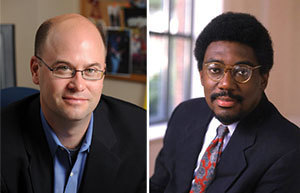ND Experts: Courts should resist 'overcriminalization'
 Richard Garnett, left, and Stephen Smith
Richard Garnett, left, and Stephen Smith
University of Notre Dame law professors Stephen Smith and Richard Garnett are encouraged that Supreme Court justices seem to endorse arguments they have made in a friend-of-the-court brief in the Yates v. United States case now being heard by the court.
On Wednesday (Nov. 5), the court heard arguments on the 2011 felony conviction of John Yates, a fisherman who had thrown back into the Gulf of Mexico 72 red grouper fish that a federal official found under the 20-inch legal minimum size. Using a provision of the 2002 Sarbanes-Oxley Act that makes it a crime to tamper with or destroy “any record, document or tangible object” with intent to obstruct a federal investigation, the government convicted Yates of a crime punishable by a prison term of to 20 years.
During the oral argument, Chief Justice John Roberts drew an eruption of laughter from the courtroom by commenting to the government’s lawyer, “You make him (Yates) sound like a mob boss or something,” and Justice Antonin Scalia wondered aloud “what kind of mad prosecutor would try to send this guy up for 20 years or risk sending him up for 20 years?” Justice Anthony Kennedy suggested that the case called into question whether judges should “use the concept or refer to the concept (of prosecutorial discretion) at all anymore.”
In their brief, professors Garnett and Smith joined other criminal law scholars in urging the court not to treat the Yates prosecution as an isolated case, arguing that it illustrated the problems created by “overcriminalization.”
“I am glad the court finally seems to understand that ‘prosecutorial discretion’ is no panacea,” Smith said. “Federal prosecutors routinely engage in overcharging — seeking disproportionately severe punishments which no reasonable person could believe warranted.
“If proportionality of punishment and the rule of law are to mean anything, federal courts must take seriously their obligation to ensure that federal prosecutors are not exceeding the proper scope of their authority under criminal statutes.”
The friend-of-the-court brief brief is available here.
Contact: Stephen Smith, 574-631-3097, ssmith31@nd.edu; Richard Garnett, 574-631-6981, rgarnett@nd.edu
Originally published by at news.nd.edu on November 11, 2014.